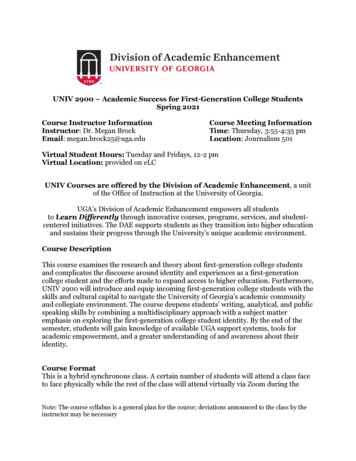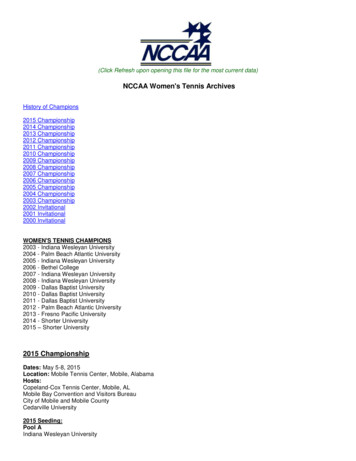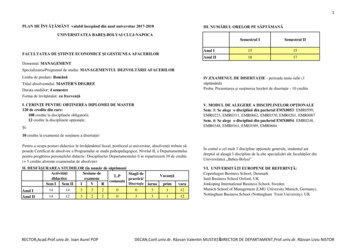
Transcription
UNIV 2900 – Academic Success for First-Generation College StudentsSpring 2021Course Instructor InformationInstructor: Dr. Megan BrockEmail: megan.brock25@uga.eduCourse Meeting InformationTime: Thursday, 3:55-4:35 pmLocation: Journalism 501Virtual Student Hours: Tuesday and Fridays, 12-2 pmVirtual Location: provided on eLCUNIV Courses are offered by the Division of Academic Enhancement, a unitof the Office of Instruction at the University of Georgia.UGA’s Division of Academic Enhancement empowers all studentsto Learn Differently through innovative courses, programs, services, and studentcentered initiatives. The DAE supports students as they transition into higher educationand sustains their progress through the University’s unique academic environment.Course DescriptionThis course examines the research and theory about first-generation college studentsand complicates the discourse around identity and experiences as a first-generationcollege student and the efforts made to expand access to higher education. Furthermore,UNIV 2900 will introduce and equip incoming first-generation college students with theskills and cultural capital to navigate the University of Georgia's academic communityand collegiate environment. The course deepens students' writing, analytical, and publicspeaking skills by combining a multidisciplinary approach with a subject matteremphasis on exploring the first-generation college student identity. By the end of thesemester, students will gain knowledge of available UGA support systems, tools foracademic empowerment, and a greater understanding of and awareness about theiridentity.Course FormatThis is a hybrid synchronous class. A certain number of students will attend a class faceto face physically while the rest of the class will attend virtually via Zoom during theNote: The course syllabus is a general plan for the course; deviations announced to the class by theinstructor may be necessary
hours listed on Athena. Here is the full description of class formats for Spring on/instructional-formats/Course MaterialsAll required course content will be provided free of charge on eLC. You are welcome toprint off materials for completing the assignments.Learning ObjectivesUpon successful completion of this course, students will be able to: Become knowledgeable of campus resources that assist with the transition to theacademic rigor and fast pace of daily life at the University of Georgia;Understand their personal identity as a first-generation, low-income, and/orunderrepresented college student in the context of a wider higher educationsphere, with an emphasis on studies of belonging on campus;Find a space to discuss and reflect among peers, from similar backgrounds on theunique opportunities and challenges of their first or second year, such as cultureshock, imposter syndrome, personal growth, and exploration.Course ScheduleThe schedule, policies, procedures, and assignments in this course are subject to changein the event of extenuating circumstances, by mutual agreement, and/or to ensurebetter student learning. All readings are required unless otherwise noted. Studentsshould read/know the required material by the date listed, at which time we will discussor use the scheduled readings in class.ClassSessionDiscussion TopicWeek 1JanIntroduction to the Course14thWeek2What does it mean to be afirst-generation student?Assignments DueComplete Student SurveyJoin Slack ChannelVia eLC, complete Student Surveyand join Slack ChannelWhoAttendsface-toface, inclassTeamRedTeamBlackNote: The course syllabus is a general plan for the course; deviations announced to the class by theinstructor may be necessary
Jan21thWeek3Jan28thWeek4Feb 4Week5Feb 11Punctuated Lecture sten ation-college-students/What does it mean to beYOU?Confronting Imposter g-first/ ploads/2017/02/Episode1 On Being First.plain-1.txt)WatchTeamLuuvie Ajayi’s Ted TalkWhiteSubmit your two assessmentideas and rubrics for Dr.Brock’s reviewCultural CapitalSelf-AdvocacyPunctuated Lecture Basedonhttps://web.stanford.edu/ vantage.pdfExperiencingUnderrepresentation:Race, Class, Gender, andMore Read the following:Hidden CurriculumTeamRedTeamBlackWatch Ted Talk on row-up-today-at-tedxpsutranscript/TeamWhiteWatch Ted Talk on PracticalDiversityWeek6Feb 18 Punctuated Lecture onRead the article featuring Lorettahttps://ecommons.luc.edu Ross/cgi/viewcontent.cgi?article 1010&context jcshesaNote: The course syllabus is a general plan for the course; deviations announced to the class by theinstructor may be necessary
TeamRedWeekDebriefing: Experiencing7UnderrepresentationFeb 25Week8Mar k9Mar 9Prioritizing Your WellbeingWeekPrioritizing Your Well10beingMar 18Week11Mar 25Week12Mar 32Week13Apr 8Week14Apr 15GritWatch one of the videos onneurodiversity from this website.Watch Talk on Self Care in PoliticalClimatesFirst Assessment Project DueRead:Racial Battle FatigueThe Role of Stereotype Threat inHealth DisparitiesWatch Ted Talk about GritRead the article: When Grit mWhiteStudent ChoiceInstructional Break-NoClassThinking Forward: GuestSpeaker Career CenterRead: RedWeekTeam15Project PresentationsSecond Assessment Project Due BlackApr 22WeekTeam16WhiteProject PresentationsMeta-Reflection DueApril29*Denotes working on a class project, meeting with the instructor (potentially outside ofclass time)Course InformationNote: The course syllabus is a general plan for the course; deviations announced to the class by theinstructor may be necessary
All course information including a copy of the syllabus, assignment due dates, andpolicy information can be found in eLC. Announcements about the class will be postedhere as well as changes to the syllabus. You are responsible for checking eLC forannouncements regularly.Grading/EvaluationThis course is graded on a plus/minus A-F scale. Your grade will be based on thefollowing assignments and class participation. For further information please look oneLC for all assignments and the posted gradebook.ParticipationDifferentiated Learning Assessment PortfolioAssignment 1 (25%)Assignment 2 (25%)25%50%Student Meta-reflection & Strategic Learning Plan25%Class Engagement – class attendance is mandatory; however, engagement isbased on the student. Students will have to reflect on their participation and gradethemselves. They will be asked to assess themselves and support their grade withevidence for weekly participation. Dr. Brock will review and independentlydetermine if she will accept the student’s submission based on the courseengagement norms we establish at the beginning of the semestersStudents are permitted 1 wellness day. Any day that you miss beyond that onepermitted wellness day absence will result in 5 point deduction to the final gradeper additional absence.Grading ScaleA 93.0-100% A- 90.0-92.9%80.0-82.9%C 77.0-79.9% C 73.0-76.9%59.9% and belowB 87.0-89.9%C- 70.0-72.9%B 83.0-86.9% BD 60.0-69.9% FProcedures of Deadline ExtensionsI encourage all students to communicate with me, Dr. Megan Brock if you need anextension on deadlines. I will demonstrate grace and work on a case by case basis todetermine deadlines for assignments that work best for the student. However, Dr. Brockwill have to also need additional time to grade work submitted past the original deadline(i.e., A students may request an extension. The extension may be granted. It will takeDr. Brock additional time to revisit the assignment and grade the assignment thatmissed the original deadline).Note: The course syllabus is a general plan for the course; deviations announced to the class by theinstructor may be necessary
Important PoliciesStudent WellnessTo be brief: take care of yourself. While navigating the rigorous (at times treacherous)experience of college, we easily may fall prey to poor habits and choices. I encouragestudents to maintain a healthy lifestyle. If you (or anyone you know) experiencesdebilitating academic stress (i.e., stress that paralyzes, induces persistent fear/anxiety),challenging life events, persistent negative emotions/moods, or other factors that hindermental, physical, or emotional wellbeing, I encourage you to seek resources you need tobe successful. Mental Health and Wellness Resources: If you or someone you know needs assistance, you are encouraged tocontact Student Care and Outreach in the Division of Student Affairs at706-542-7774 or visit https://sco.uga.edu/. They will help you navigateany difficult circumstances you may be facing by connecting you with theappropriate resources or services. UGA has several resources for a student seeking mental health ga) or crisis support(https://www.uhs.uga.edu/info/emergencies). If you need help managing stress anxiety, relationships, etc., please visitBeWellUGA (https://www.uhs.uga.edu/bewelluga/bewelluga) for a list ofFREE workshops, classes, mentoring, and health coaching led by licensedclinicians and health educators in the University Health Center. Additional resources can be accessed through the UGA App.University Health Center Website: https://www.uhs.uga.edu/newstudents/newstudents Phone: 706.542.1162 Email: contact@uhs.uga.edu Suicide Prevention 706.542.2 Sexual Assault 24 Hour Hotline 706. 542.SAFE200Counseling and Psychiatric Services (CAPS) Website: https://www.uhs.uga.edu/caps/welcome During office hours, you may call 706-542-2273. For an after-hour crisis, you may call 706-542-2200. Ask to speak with a CAPsclinician.Student Care and Outreach Website: http://sco.uga.edu/Note: The course syllabus is a general plan for the course; deviations announced to the class by theinstructor may be necessary
Phone: 706-542-7774Email: sco@uga.eduStudent Veterans Resource Center Website: http://svrc.uga.edu/ Phone: 706-542-7872 Email: svrc@uga.eduOther Division ResourcesFrom peer tutoring through the Academic Resource Center to Academic Coaching to Student SuccessWorkshops and more, the Division is committed to the success of all students at the University ofGeorgia. For more on these and other resources, visit https://dae.uga.edu.Student Exceptionalities StatementIf you anticipate issues related to the format or requirements of this course, please meetwith me. I would like us to discuss ways to ensure your full participation in the course. Ifyou determine that formal, disability-related accommodations are necessary, it is veryimportant that you be registered with the Disability Resource Center (Voice: 706-5428719 or TTY: 706-542-8778) and notify me of your eligibility for reasonableaccommodations. We can then plan how best to coordinate your accommodations.Coronavirus (COVID-19) Pertinent PoliciesFace Coverings:Effective July 15, 2020, the University of Georgia—along with all University System ofGeorgia (USG) institutions—requires all faculty, staff, students, and visitors to wear anappropriate face covering while inside campus facilities/buildings where six feet socialdistancing may not always be possible. Face covering use is in addition to and is not asubstitute for social distancing. Anyone not using a face covering when required will beasked to wear one or must leave the area. Reasonable accommodations may be made forthose who are unable to wear a face-covering for documented health reasons. Studentsseeking accommodation related to face coverings should contact Disability Services athttps://drc.uga.edu/.DawgCheck:Please perform a quick symptom check each weekday on DawgCheck—on the UGA appor website—whether you feel sick or not. It will help health providers monitor the healthsituation on campus: https://dawgcheck.uga.edu/Note: The course syllabus is a general plan for the course; deviations announced to the class by theinstructor may be necessary
What do I do if I have symptoms?Students showing symptoms should self-isolate and schedule an appointment with theUniversity Health Center by calling 706-542-1162 (Monday-Friday, 8 a.m.-5 p.m.).Please DO NOT walk-in. For emergencies and after-hours care, seehttps://www.uhs.uga.edu/info/emergencies.What do I do if I am notified that I have been exposed?Students who learn they have been directly exposed to COVID-19 but are not showingsymptoms should self-quarantine for 14 days consistent with the Department of PublicHealth (DPH) and Centers for Disease Control and Prevention (CDC) guidelines. Pleasecorrespond with your instructor via email, with a cc: to Student Care & Outreachat sco@uga.edu, to coordinate continuing your coursework while self-quarantined. Ifyou develop symptoms, you should contact the University Health Center to make anappointment to be tested. You should continue to monitor your symptoms daily onDawgCheck.How do I get a test?Students who are demonstrating symptoms of COVID-19 should call the UniversityHealth Center. UHC is offering testing by appointment for students; appointments maybe booked by calling 706-542-1162.UGA will also be recruiting asymptomatic students to participate in surveillance tests.Students living in residence halls, Greek housing, and off-campus apartment complexesare encouraged to participate.What do I do if I test positive?Any student with a positive COVID-19 test is required to report the test in DawgCheckand should self-isolate immediately. Students should not attend classes in-person untilthe isolation period is completed. Once you report the positive test through DawgCheck,UGA Student Care and Outreach will follow up with you.Participation PolicyAttendance and Participation are required for this class. Missing even one class meansthat you have missed a significant portion of the course. Please DO NOT schedule anyother appointments or activities during your scheduled class sessions.Inclement WeatherIf the university cancels classes, such as for severe weather, students are expected tocontinue with readings as originally scheduled. Any assignments scheduled during thoseNote: The course syllabus is a general plan for the course; deviations announced to the class by theinstructor may be necessary
missed classes, such as a project or paper, are due at the next class meeting unless otherinstructions are posted on the course website or communicated via emailAcademic Honesty PolicyAs a University of Georgia student, you have agreed to abide by the University'sacademic honesty policy, "A Culture of Honesty," and the Student Honor Code. Allacademic work must meet the standards described in "A Culture of Honesty" found onesty-policy. Lack of knowledge ofthe academic honesty policy is not a reasonable explanation for a violation. Questionsrelated to course assignments and the academic honesty policy should be directed to theinstructor.All students are responsible for maintaining the highest standards of honesty andintegrity in every phase of their academic careers. The penalties for academic dishonestyare severe and ignorance is not an acceptable defense. “Academic Honesty” meansperforming all academic work without plagiarism, cheating, lying, tampering, stealing,receiving unauthorized or illegitimate assistance from another person, or using anysource of information that is not common knowledge."Academic Dishonesty" means knowingly performing, attempting to perform, orassisting any other person in performing any academic work that does not meet thisstandard of academic honesty. Assistance by another, when authorized by the FacultyMember, will not be considered academically dishonest, nor will be using informationthat is fairly attributed to the source.All academic work must meet the standards contained in “A Culture of Honesty.”Students are responsible for informing themselves about those standards beforeperforming any academic work.Federal Family Educational Rights and Privacy Act (FERPA) Notice:The Federal Family Educational Rights and Privacy Act (FERPA) grants students certaininformation privacy rights. See the registrar's explanation at reg.uga.edu/ generalinformation/ferpa/. FERPA allows disclosure of directory information (name, address, telephone,email, date of birth, place of birth, major, activities, degrees, awards, prior schools) unlessrequested in a written letter to the registrar.Note: The course syllabus is a general plan for the course; deviations announced to the class by theinstructor may be necessary
AppendicesParticipation Rubric (55 possible points)ClassSessionWeek 1Discussion TopicGrade Your Participation:See Key Below*Grade:What evidence supports thisgrade?Week 2Grade:What evidence supports thisgrade?Week 3Grade:What evidence supports thisgrade?Week 4Grade:What evidence supports thisgrade?Week 5Week 6Grade:What evidence supports thisgrade?Grade:What evidence supports thisgrade?Week 7Grade:What evidence supports thisgrade?Week 8Grade:What evidence supports thisgrade?Week 9Grade:What evidence supports thisgrade?Week 10Grade:What evidence supports thisgrade?Note: The course syllabus is a general plan for the course; deviations announced to the class by theinstructor may be necessary
Grade:What evidence supports thisgrade?Grade:What evidence supports thisgrade?Week 11Week 12Week 13Instructional Day: No ClassGrade:What evidence supports thisgrade?Grade:What evidence supports thisgrade?Week 14Week 15Examples:A-Level Participation (5 Pts): You demonstrated active, deep listening during class. Youarrived prepared so you were able to make informed contributions to the ongoing classbased on your reflection of required reading/videos and personal experience.B-Level Participation (4 pts): You arrived prepared (i.e., having completed requiredreading/videos, etc.), so you were able to contribute to class discussion.C-Level Participation (3 pts): You only responded to prompts when asked by theprofessor and/or guest speaker (if you had a guest speaker this week).D-Level Participation (2 pts): You were present but did not participate meaningfullyF-Level Participation (0 pts): You were not present.W-“I used a wellness day.”Note: The course syllabus is a general plan for the course; deviations announced to the class by theinstructor may be necessary
Assignment Options (Select 2)Differentiated Learning Assessment Portfolio 60%Assessments:o Reading/Video Exams§ Take a Midterm§ Take a Final Assessmento Writing a Reflection Paper§ Course Reflection 1 (3 Pages, double-spaced, 12 pt font, Times NewRoman) §Summarize what you learned from the first half of thesemesterDiscuss why this information is relevant to first-generationcollege studentsHow you will integrate this information to your practice as afirst-generation college studentsCourse Reflection 2 (3 Pages, double-spaced, 12 pt font, Times NewRoman) Summarize what you learned from weeks 7-12 of class Discuss why this information is relevant to first-generationcollege students How you will integrate this information into your successplano Suggested Alternatives:§ Develop a website that highlights Resources for first-generationstudent success§ Develop a podcast (minimum discussing topics relevant to yourtransition. Including, but not limited to, interviewing guests,providing tips, etc.§ Create a mixtape/playlist that is reflective of the experience of theFrist-generation College Student§ Develop an art portfolio documenting the life, challenges, andsuccesses of a First-Generation College StudentNote: The course syllabus is a general plan for the course; deviations announced to the class by theinstructor may be necessary
Last Assignment of Semester: Course Meta-reflection &* Strategic LearningPlan (4-5 Page Reflection, double-spaced, 12 pt font, Times New Roman)o Discuss the topics we covered over the course of the semester (with intext citations); make sure to note how the topics/content is relevant tothe success of first generation college students. Also, highlight thecampus resources most relevant to your success. Compare who youwere at the beginning of the semester to the end of the semestero Outline 1(one) 6-month and 1(one) 1- year personal goalo Outline 1(one) 6-month and 1(one) 1- year professional goal§ Goals should be specific and have deadlines. Each goal shouldhave a series of steps that lead to the completion of the goal andreference the person, resources, offices, etc. that you will accessand when you will accomplish these sub steps.o Summarize by sharing the advice you would give to another FirstGeneration ScholarNote: The course syllabus is a general plan for the course; deviations announced to the class by theinstructor may be necessary
Note: The course syllabus is a general plan for the course; deviations announced to the class by the instructor may be necessary UNIV 2900 - Academic Success for First-Generation College Students Spring 2021 Course Instructor Information Course Meeting Information Instructor: Dr. Megan Brock Time: Thursday, 3:55-4:35 pm










